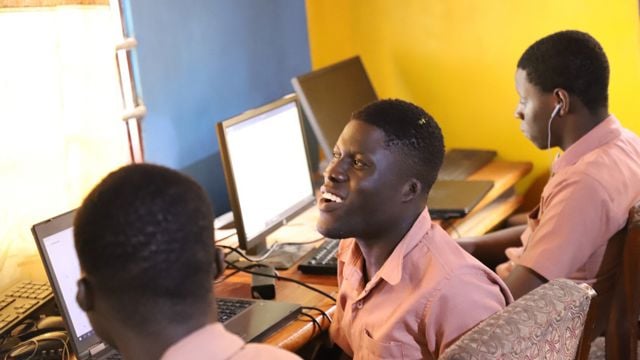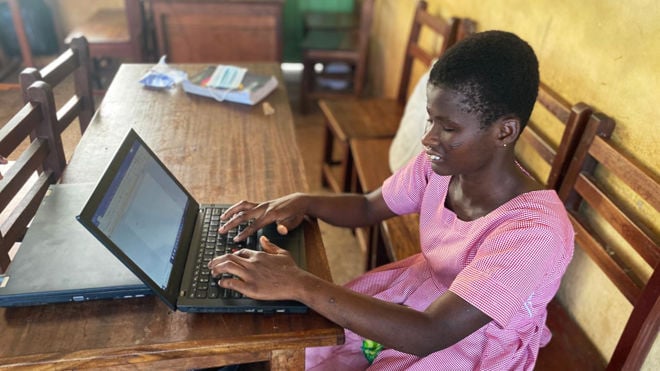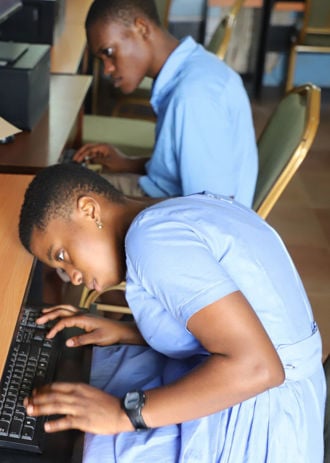Unlocking Digital Opportunities for the Visually Impaired

With Norwegian support, visually impaired people in developing countries are learning to master digital tools – gaining access to a world that was previously closed to them.
Since 2021, the collaboration between the Government of Norway and the International Telecommunication Union (ITU) has been making a noticeable impact.
The project, "Boosting Digital Skills through Digital Transformation Centres" (DTC), has expanded its offerings to empower visually impaired individuals in developing countries, unlocking digital opportunities for underserved and marginalized communities through specialized digital skills training.

The project "Boosting Digital Skills through Digital Transformation Centres" is empowering visually impaired individuals with essential digital skills
A Game-changer
In Ghana, the impact has been profound. According to a 2020 report by the Global System for Mobile Communications (GSMA), only 7% of visually impaired individuals in Ghana owned smartphones, with a mere 5% having used mobile Internet services. The lack of digital skills and awareness was a significant barrier.
The ‘’Introduction to Computer Basics for Visually Impaired Persons”’ (ICBVI) course has been a game-changer. In its first year of implementation (2024), it reached 600 visually impaired Ghanaians, with 47% being female. The course is specially tailored to teach learners to use screen readers and voice recognition software, to use digital technology. The course applies accessible design principles to ensure the unique needs of persons with visual impairments are met.
– I have learned how to use a keyboard, write emails, and navigate basic Microsoft Office applications. This has significantly enhanced my academic prospects, says Zainab Adam a third-year high school student from the Bono region.
– I have gained essential digital skills, enabling me to type, read screens, and set up passwords on my computer. This gives me a greater sense of independence and empowerment, says Nafisa Issifu, a secondary school student from Bawku.
They are prime examples of the course's impact.

Nafisa has gained new opportunities after receiving digital training.
Expanding Reach and Impact
The DTC project’s efforts extend beyond Ghana. Digital Transformation Centres are equipped to deliver digital skills training to visually impaired individuals in Ghana, Pakistan, Sierra Leone, Senegal, and soon Uganda.
The collaboration between Norway, ITU, and the ST Microelectronics Foundation (ST Foundation) has been pivotal in rolling out the transformative "Introduction to Computer Basics for the Visually Impaired" (ICBVI) courses in all the countries mentioned above.

The tools in the course have been developed with universal design in mind, ensuring the training meets the needs of blind and visually impaired participants.
Transformative Results
This initiative directly contributes to the United Nations Sustainable Development Goals (SDGs) 4, 9, and 10, promoting inclusive and equitable quality education, resilient digital ecosystems, and reduced inequalities.
This project also aligns seamlessly with Norway’s "Equality for All" strategy for 2022-25, echoing the ambition of the 2030 Agenda to ensure that no one is left behind in development cooperation.
– The ICBVI program has transformed my daily life. I now independently use phones and WhatsApp, which is enhancing my social interactions and educational pursuits, says Benjamin Akapo, a senior high school graduate.
Norwegian aid has truly contributed to the empowerment of visually impaired individuals, bridging the digital divide and fostering greater autonomy and participation in the digital economy.
– This shows how targeted efforts can create lasting change for groups that are often forgotten. When technology and inclusion go hand in hand, we push boundaries – and build societies that have room for everyone, says Head of Section for Education and Research in Norad, Thomas Poulsen.